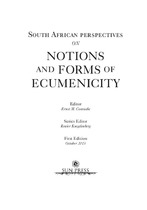| dc.contributor.author | Conradie, Ernst | |
| dc.date.accessioned | 2014-12-12T12:25:10Z | |
| dc.date.available | 2014-12-12T12:25:10Z | |
| dc.date.issued | 2013 | |
| dc.identifier.citation | Conradie, E.M. (2013). Notions and forms of ecumenicity: some South African perspectives. In Conradie, EM (ed): South African perspectives on notions and forms of ecumenicity. Stellenbosch: SUN Press, pp. 9-22 | en_US |
| dc.identifier.isbn | 978-1-920689-07-0 | |
| dc.identifier.uri | http://hdl.handle.net/10566/1322 | |
| dc.description.abstract | This contribution addresses the abstract question of how the adjective “ecumenical” may be understood. What notions and forms of ecumenicity may be identified? There may be no single authoritative definition, but one may identify a range of specific connotations attached to the term “ecumenical”. Here I will have to fly a bit higher in order to gain an “overview” that is wider than South Africa. I will offer some South African perspectives where appropriate. In what follows below I will identify and briefly describe some 23 distinct ways in which the term “ecumenicity” can and has been understood in different historical epochs and contexts | en_US |
| dc.language.iso | en | en_US |
| dc.publisher | SUN Press | en_US |
| dc.rights | Copyright Ecumenical Foundation of Southern Africa and Ernst Conradie. This work is licensed under a Creative Commons Attribution-NonCommercial 4.0 International License. | |
| dc.subject | Ecclesiastical history | en_US |
| dc.subject | Political developments | en_US |
| dc.subject | Kairos Document | en_US |
| dc.subject | Church leaders | en_US |
| dc.subject | South Africa | |
| dc.title | Notions and forms of ecumenicity: some South African perspectives | en_US |
| dc.type | Book chapter | en_US |
| dc.privacy.showsubmitter | false | |
| dc.status.ispeerreviewed | false | |

